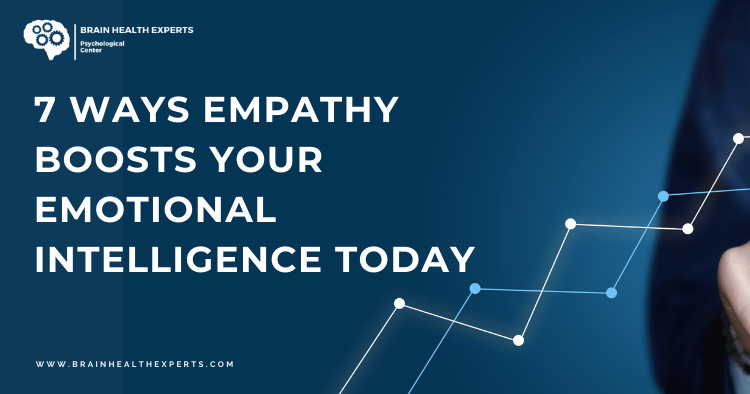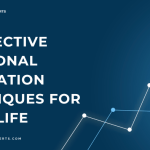Table of Contents
- Understanding Empathy and Emotional Intelligence
- 1. Enhances Self-Awareness
- 2. Improves Communication Skills
- 3. Fosters Stronger Relationships
- 4. Increases Conflict Resolution Abilities
- 5. Promotes Compassionate Leadership
- 6. Boosts Team Collaboration
- 7. Encourages Personal Growth
- Conclusion
Understanding Empathy and Emotional Intelligence
Empathy and emotional intelligence (EI) are two interconnected concepts that can significantly impact our personal and professional lives. Empathy is the ability to understand and share the feelings of others, while emotional intelligence encompasses the skills necessary to perceive, evaluate, and manage emotions—both our own and those of others.
Empathy is not just about feeling; it’s about understanding and acting upon that understanding.
Recent studies in 2024 have shown that individuals with high emotional intelligence not only experience better mental health but also excel in workplace environments, leading to increased job performance and effective leadership. Let’s explore how cultivating empathy can enhance your emotional intelligence today.
1. Enhances Self-Awareness
Self-awareness is the foundation of emotional intelligence. By practicing empathy, you become more attuned to your own emotions and how they affect your interactions with others. When you take the time to consider someone else’s perspective, you can better understand your emotional responses in various situations.
How to Practice It:
- Reflection: Spend a few minutes each day reflecting on your emotional experiences.
- Journaling: Keep a journal where you note instances when you felt strong emotions and the context behind them.
Self-awareness is the first step toward emotional growth; empathy can magnify that awareness.
FAQ:
Q: How does empathy improve self-awareness?
A: Empathy encourages you to think about how your emotions resonate with others, leading to a deeper understanding of yourself.
2. Improves Communication Skills
Effective communication is a vital component of emotional intelligence. Empathy allows you to connect with others on a deeper level, facilitating open and honest exchanges. When you actively listen and validate someone’s feelings, it encourages them to communicate more authentically.
Key Techniques:
- Active Listening: Pay attention not just to what is said but to the emotions behind the words.
- Open-Ended Questions: Encourage dialogue by asking questions that prompt deeper responses.
Good communication is less about speaking and more about understanding.
FAQ:
Q: What role does empathy play in communication?
A: Empathy fosters an environment of trust, enabling better communication and understanding. For more on communication skills, check out 10 Powerful Techniques to Cultivate Positive Mindset.
3. Fosters Stronger Relationships
Empathy is the glue that binds relationships, whether personal or professional. When you show genuine concern for others’ feelings, it builds trust and strengthens the bond between you and those around you. Stronger relationships lead to a more supportive environment, enhancing emotional intelligence.
Relationship-Building Tips:
- Be Present: Make an effort to be fully present in conversations.
- Show Appreciation: Regularly express gratitude for others’ contributions and feelings.
Relationships flourish when empathy is at the core of interactions.
FAQ:
Q: How does empathy contribute to relationship building?
A: Empathy helps you understand others better, which fosters trust and intimacy in relationships. For insights on how positive thinking transforms relationships, see 10 Ways Positive Thinking Transforms Your Relationships.
4. Increases Conflict Resolution Abilities
Conflicts are inevitable, but empathy can turn potential disputes into opportunities for growth. By understanding the emotions and motivations of all parties involved, you can find common ground and facilitate resolution. This ability is a hallmark of high emotional intelligence.
Conflict Resolution Strategies:
- Acknowledge Emotions: Validate the feelings of all parties involved.
- Seek Mutual Solutions: Focus on finding a resolution that addresses the needs of everyone.
Empathy in conflict resolution transforms tension into understanding.
FAQ:
Q: How does empathy assist in conflict resolution?
A: Empathy enables you to see the situation from all perspectives, making it easier to find a solution that satisfies everyone. For strategies on managing stress related to conflict, visit 10 Proven Stress Management Techniques for Daily Relief.
5. Promotes Compassionate Leadership
Leaders with high emotional intelligence are more effective because they understand the needs and emotions of their team. Empathy allows leaders to inspire and motivate their teams, leading to increased morale and productivity. Compassionate leadership is about being in tune with your team’s emotions.
Leadership Practices:
- Regular Check-Ins: Schedule one-on-one meetings to understand your team members’ challenges.
- Encourage Feedback: Create an open channel for team members to express their thoughts and feelings.
Compassionate leadership is not just about authority; it’s about connection.
FAQ:
Q: Why is empathy important in leadership?
A: Empathetic leaders create a positive work environment, leading to higher employee satisfaction and retention. For more on fostering a positive workplace, read 10 Ways Positive Thinking Boosts Workplace Success.
6. Boosts Team Collaboration
Empathy is crucial for teamwork; it helps team members understand each other’s strengths and weaknesses. By fostering an empathetic culture, teams can collaborate more effectively, leading to innovative solutions and improved performance.
Collaboration Tips:
- Team-Building Activities: Engage in activities that promote understanding and communication among team members.
- Empathy Mapping: Use empathy maps to visualize team members’ thoughts and feelings.
Collaboration thrives in an atmosphere of mutual understanding.
FAQ:
Q: How does empathy enhance team collaboration?
A: Empathy allows team members to connect on a personal level, fostering openness and cooperation. For additional techniques to enhance collaborative efforts, see 10 Positive Thinking Exercises to Boost Mental Health.
7. Encourages Personal Growth
Lastly, practicing empathy can lead to profound personal growth. By understanding others, you can challenge your own beliefs and assumptions, leading to a broader perspective. This growth fosters resilience and adaptability, two key components of emotional intelligence.
Personal Growth Activities:
- Volunteer Work: Engage in community service to expose yourself to different perspectives.
- Diverse Interactions: Make an effort to connect with people from various backgrounds.
Personal growth often begins with understanding those around you.
FAQ:
Q: In what ways can empathy contribute to personal growth?
A: Empathy broadens your worldview, helping you to become more adaptable and open-minded. For insights on personal growth through positive thinking, check out 10 Ways Positive Thinking Fuels Personal Growth Journey.
Conclusion
Empathy is not just a soft skill; it’s a powerful tool that can significantly enhance your emotional intelligence. By incorporating these seven strategies into your daily life, you can foster a deeper understanding of yourself and those around you. As you develop your empathy, you will likely notice improvements in your relationships, communication, and overall emotional well-being.
Remember, empathy is the root of emotional intelligence and the key to personal and professional success.
For further reading on empathy and emotional intelligence, check out Harvard Business Review’s article on Emotional Intelligence.
Remember, growing your emotional intelligence through empathy is a journey, not a destination. Start today, and watch how it transforms your life! Also, consider exploring practical techniques and exercises on positive thinking that can bolster your emotional wellness by visiting 10 Positive Thinking Techniques to Reduce Stress.





